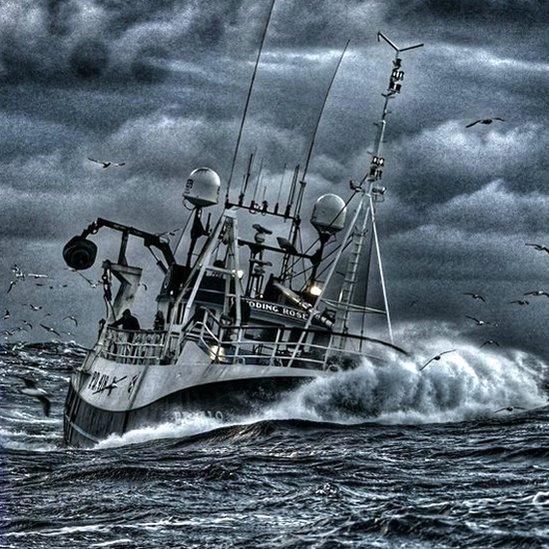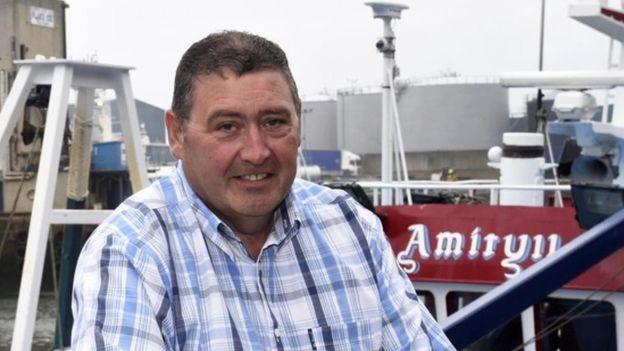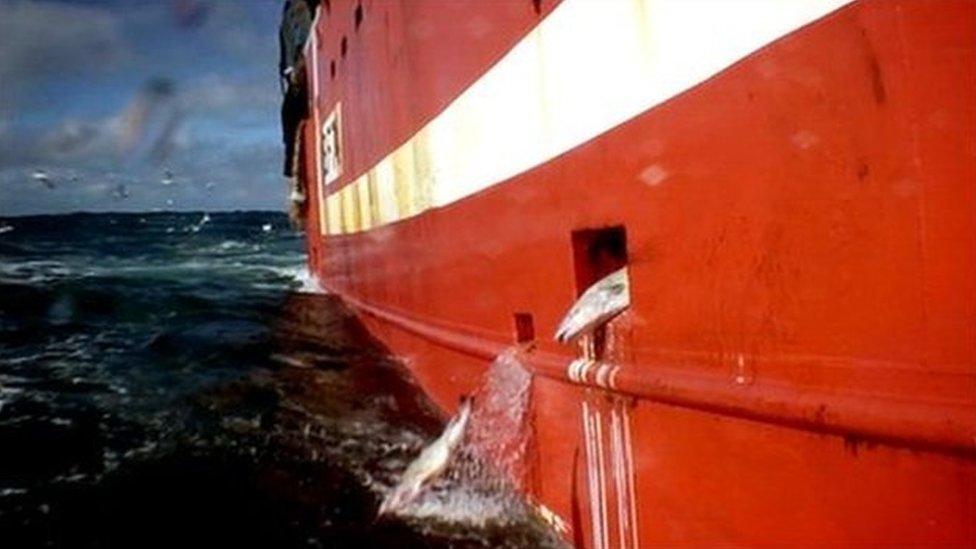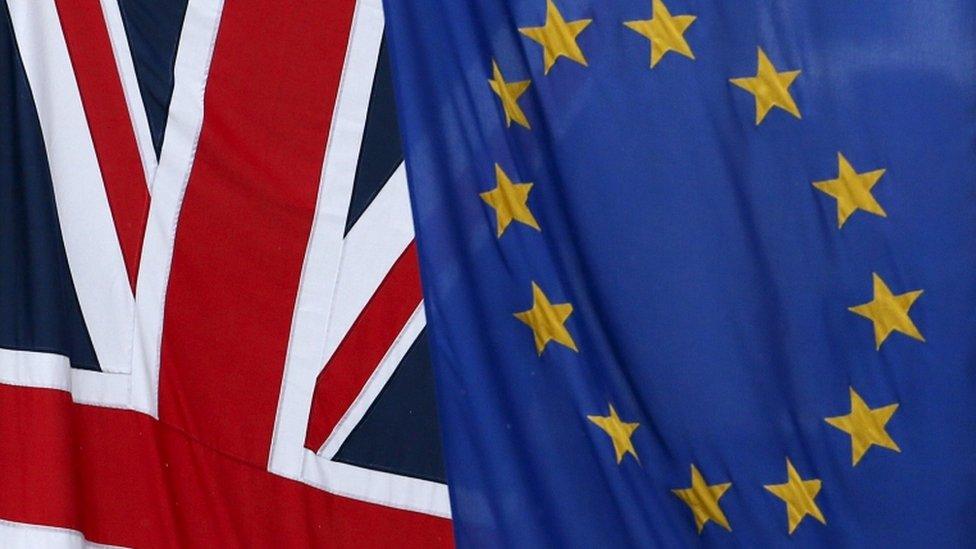EU referendum: Would Scotland's fishermen be better in or out?
- Published

Peterhead boats brave the North Sea to land their catch in Europe's busiest white fish port
The fishing industry plays a key role in the economy of the North East of Scotland. Ahead of the EU referendum on 23 June, I spoke to two different camps of opinion.

"I have not met a local fisherman yet who would not pack his bags and leave the EU."
The words of Jimmy Buchan - skipper of Peterhead's Amity II who featured in the BBC's Trawlermen series.
He has worked at sea since leaving school in 1976.
The 55-year-old's feelings on the forthcoming referendum on whether the UK should stay in the EU are clear - leave in a bid to secure a future for fishermen.
The Aberdeenshire town of Peterhead is Europe's largest white fish port, so the topic could hardly be more crucial.
The Scottish government believes that EU membership is in the "best interests" of Scotland's fishing industry.
In 2014, Scotland exported £449m of fish and seafood to Europe - 68% of the total value of Scottish food exports into that market.
Worldwide, seafood exports are the second largest food and drink export behind whisky, and the industry supports thousands of jobs.
Peterhead alone handles tens of millions of pounds worth of fish annually.
Much stays in the UK to be processed, including for the country's fish and chip shops and supermarkets, but the European market is also hungry for the quality, fresh product, especially the likes of Spain.
Before the processors can export, the fish has to be landed. And European regulations governing catches have long been a bone of contention for those fishermen out at sea.
The technical measures for fishermen can roughly fall into three groups;
Minimum legal sizes of fish
Fishing gear design including mesh sizes
Restricting fishing in some areas or seasons
One main aim is limiting the catch of unwanted - notably juvenile - fish.
In 2013, major reform of the EU Common Fisheries Policy (CFP) was approved.
The reform package included measures to protect endangered stocks, bring in more regional management and have more long-term planning.
Incidents of throwing dead fish back into the sea had increased due to restrictions on which fish could be landed.
Gradually eliminating discards of unwanted catches started in January last year.
'Too far removed'
Mr Buchan believes it is now time to leave European control behind.
He told the BBC Scotland news website: "Decades of failures have left us with little or no alternative but to vote for Brexit [British exit].
"All about the EU is not bad but on balance our industry has been badly treated by unelected, unaccountable bureaucrats who are pressured by lobbyists in Brussels.
"It's too far removed, one glove does not fit all."
He explained: "I left school in 1976 to begin fishing, I have always been under the union.
"It was a common market, but over the years it got worse and worse and worse, some businesses are being strangled by regulations.
"Landing obligations cannot work unless quotas rise - it will be the final nail in the coffin.
"Processors have had to suffer hardship too, but some will think their market is out there in Europe - so they have a commercial decision to make.

Jimmy Buchan: "Decades of failures have left us with little or no alternative but to vote for Brexit."
"When I go to the ballot box, it's time to take that leap in the dark. I am prepared, we have everything to gain and nothing to lose."
He continued: "This is a lifetime, generational change.
"We have weathered a decline in stocks and things are on the up thanks to sustainability and responsibility - we are much wiser than we were 40 years ago.
"We need to see investment in young people now - never more so with the collapse of the oil and gas sector.
"New boats are on order, so people can see an element of a future. Will it be a future free from Europe?
"Let's try something different and allow our communities to thrive, creating work and business growth."
'Strongest emotions'
The Scottish Fishermen's Federation (SFF) was formed in 1973, with the aim of protecting the collective interests of those out catching fish.
Its chief executive, Bertie Armstrong, said it was a complicated debate.
Mr Armstrong said: "Europe - and our place in it - is never far away from the forefront of politics and passionate debate. Being part of the EU affects all walks of life, but most especially fishing.
"Indeed, the very term Common Fisheries Policy stokes the strongest emotions within the industry."

Free movement of labour is seen as a benefit for the processing sector
He explained his organisation would not tell members which way to vote but it could highlight issues at the forefront of the debate.
Mr Armstrong explained: "For the individual voters involved, the fundamental question is whether there is scope to beneficially develop the CFP inside the EU, or, should the referendum so decide, would leaving the EU be the best option?
"Sovereignty and jurisdiction - beyond each member state's slim strip of territorial waters - is pooled and the EU uses the Common Fisheries Policy to govern every aspect of the industry. That fundamental change - the trading of sovereignty for collective control - took place when we joined.
"Collaboration is vital under any governance regime, but non-EU coastal states such as Norway and Iceland retain jurisdiction and negotiate on their own behalf."
'Open market'
Mr Armstrong continued: "If the UK were to leave the EU, then the UK's long-lost control over the greater part of the northern European fishing grounds would be restored.
"This is a statement of fact rather than a killer argument for withdrawal because, of course, there are other factors to consider in the balance."
He said that the UK rules would need to be in accordance with fish-stock science and be negotiated with other coastal states, including those still in the EU.
Mr Armstrong added: "Despite this, from the fishing industry point of view, leaving the CFP still instinctively sounds like a good thing - more so if the balance between that gain and the other effects of leaving the EU turned out to be positive - and of course, presuming that the UK and Scottish home nation governments could do a better fisheries management job than the EU does at the moment.
"But the whole debate is much more complicated than this, and the balance of benefits brought through membership of the EU also needs to be carefully considered - not least those provided by an open market place for our seafood products, and no doubt for many other reasons too."

Discards have been a controversial issue
He said that the free movement of labour within the Eurozone was a contentious issue, but it "undeniably" benefited the fishing and seafood processing sector.
Mr Armstrong told the BBC: "We could spend all day listing the faults of the CFP, but the major underlying one is the persistent micro-management from Brussels and lack of regional control of fisheries.
"Much better instead to manage fisheries regionally and adopt regional management for regional issues, and the recently reformed CFP did go some way towards achieving this - management has moved closer to the practitioners, but that change now needs to be developed further.
"From those politicians arguing for us to stay within the EU, we would like to see a pledge on that."
'Greatest achievement'
European Parliament fisheries committee vice chairman Jaroslaw Walesa believed the CFP was one of the "pillars of the EU and its greatest achievement".
He said it was designed to manage common resources and give all European fishing fleets equal access to EU fishing grounds in order to compete fairly.
"It would be pity if the Scottish fishing industry had to be out of it," insisted Mr Walesa.

The UK vote will be held in June
He added: "Brexit means that Scottish fishermen will be cut off from the traditional fishing grounds.
"Also, if this happens, the Scottish fishing industry will not be able to benefit from EMFF - the fund for the EU's maritime and fisheries policies for 2014-2020.
"It helps fishermen in the transition to sustainable fishing, supports coastal communities, finances projects that create new jobs and improve quality of life along European coasts. So the money for, for example, gear development and innovations in new technologies will be lost for Scottish fishermen.
"Also CFP supports more sustainable stocks. Coastal states such as Iceland or Faroes are currently taking unsustainable amounts of fish, would Scottish fisherman like to join them?
"The CFP now states that we will have more regionalised policy, so Scotland will gain greater control over certain policy areas whilst still feeling the benefits of being in the Union."
'Significant benefits '
A Scottish government spokesman said it believed that EU membership was in the best interests of Scotland's fishermen and farmers.
He added: "EU membership provides a range of significant benefits to our seafood sector and farming communities, including direct access to financial assistance, free access to a common food export market of over 500 million consumers, and the protections and opportunities offered by being part of a major global trading bloc.
"It is now more important than ever that those who support Scotland's continued EU membership make the case as strongly as possible.
"The Scottish government will be at the forefront of making that argument, and we will continue to support reform of the EU from within it."
The referendum will be held on 23 June. There could yet be some stormy waters on the debate horizon for the Scottish fishing industry in the final days left before the vote.
- Published30 December 2020
